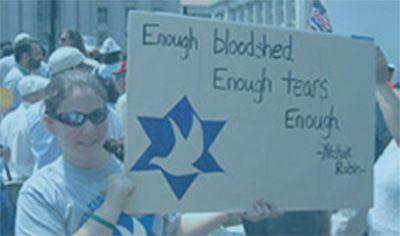| BTvS emerged at the height of the Second Intifada, when the hope of final status negotiations was within recent memory. Many of the group’s founding board members, including Aliza Becker, David Albert, Cherie Brown, Marcia Freedman, Neal Gosman, Ira Grupper, Yossi Khen, Rabbi Rebecca Lillian, Steve Masters, Penny Rosenwasser, Rabbi David Seidenberg, Nicole Dannenberg Sorger, and Donna Spiegelman, met at the JUNITY Conference. They began a post-conference discussion listserv as a way to keep in touch. In less than a year, the group had chosen a name in Hebrew and English, authored founding principles with a clear endorsement for two states, and planned a founding conference held in April 2002.
BTvS was founded on the assumption that the U.S. could play a leadership role in brokering an agreement between Israelis and Palestinians. The group’s populist focus was to organize the majority in the Jewish community who supported two-states into an advocacy and political block. Because the issue had become so contentious in the Jewish community, BTvS also sought to open up community dialogue on the conflict. BTvS was boots-on-the-ground style activism, as members across the country mobilized in their local communities. They engaged in dialogue with the leadership of mainstream Jewish organizations and synagogues, participated in Jewish community events, joined Jewish Community Relations Councils (JCRCs), sponsored regular community events, and wrote op-eds and letters to the editor to local Jewish media. Some communities organized local Rabbinic Cabinets, bringing sympathetic rabbis to network and strategize at a time when talking about peace with Palestinians was contentious. Most importantly, BTvS became a resource on current events and legislative issues to members of Congress and their staff. For many in Congress, meetings with BTvS were a refreshing opportunity to have an honest conversation about a contentious issue. BTvS was strictly an American organization. It did not have an official relationship with any Israeli peace group or political party, but it did organize multi-city speaking tours for Israeli and Palestinian grassroots peace activists, politicians and pundits in synagogues, Hillels and JCCs. BTvS was the first to bring to American Jewish audiences the Bereaved Parents Circle (2002), pilot refuser Yonatan Shapira (2005), Shovrim Shtika/Breaking the Silence (2005), and Israeli and Palestinian members of Combatants for Peace (2007). Other tours featured former Knesset Deputy Speaker Naomi Chazan, former Labor party leader Amram Mitzna, pundit Daniel Levy, and BTvS president and former MK Marcia Freedman. BTvS campaigns were central to galvanizing support, educating wide audiences, and providing concrete steps that could help advance peace. The 2013 “Call to Bring the Settlers Home to Israel,” the first BTvS campaign, garnered 10,000 signers and highlighted the fact that a majority of settlers reported they were willing to relocate to Israel proper with appropriate compensation as part of a peace agreement. |
 On several occasions, BTvS organized campaigns in close collaboration with other organizations. It participated in a multi-pronged effort to promote support for the 2007 Annapolis peace conference, a Bush administration effort to reignite Israeli-Palestinian peace talks. BTvS joined forces with other pro-Israel and pro-peace organizations to rally outside the Naval academy during the conference; they also co-sponsored a Capitol Hill Briefing, and cooperated on other activities. BTvS’ collaborative approach was particularly effective in advocacy efforts. A Washington, DC office that opened at the end of 2005 worked on bringing together Jewish, Christian and Arab organizations to work on a series of legislative initiatives. One of the more significant successes was the bi-partisan Ackerman-Boustany letter to Secretary Rice expressing support for the Annapolis conference; it secured 135 House signers from both sides of the aisle. BTvS used cutting edge advocacy software to quickly reach a broad constituency. Education was also a major BTvS priority. This included training chapter activists, offering original educational materials, listserv postings on current events, programs for chapters, and periodic Town Hall Conference calls with prominent politicians and policy makers. During the Gaza War, around 1000 people participated in a series of four such calls. The extensive growth of BTvS was due to systematic grassroots outreach at Jewish communal and chapter-sponsored events, campaign mobilization, and online and traditional media ad placements. A volunteer Harvard-based statistician, Donna Spiegelman, spearheaded these efforts, regularly analyzing data for the effectiveness of each approach. The top leadership of BTvS was predominantly female – founding board president Marcia Freedman, and executive directors Diane Balser and Aliza Becker — and a commitment to women’s leadership was central to the work of the organization. Even when six full-time staff were employed, hundreds of BTvS volunteers continued to donate many hours a week Staff members built strong personal relationships with grassroots activists. However, after 7 years, it became clear that passion alone was not enough; success required greater resources. Thus, the BTvS Board was very supportive of joining forces with J Street in 2010. |


 I just remember a moment when I suddenly felt like maybe we can really do this, maybe I don't have to sit on the sidelines with my views and my heartbreak, maybe its time for new leaders -- including me - to stand up and speak out.”
I just remember a moment when I suddenly felt like maybe we can really do this, maybe I don't have to sit on the sidelines with my views and my heartbreak, maybe its time for new leaders -- including me - to stand up and speak out.”